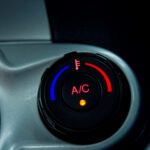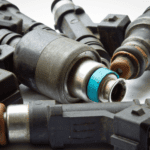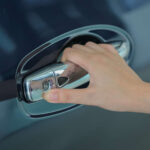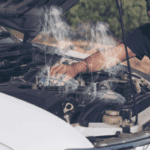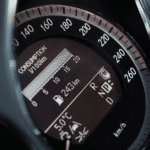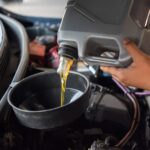It can be concerning when you get in your car, fire it up, and it shakes when idling but runs smoothly as soon as you start driving. It can sometimes feel like the engine will fall out the bottom of the car, but will it be that catastrophic?
To clarify, a shake can range from a slight vibration to a violent wobble affecting the entire vehicle when idling. This article aims to cover all the possible reasons for this issue. There are eight reasons I’ve come across over the years when inspecting a car for shaking when it’s idle, ranging from minor vibrations that are not normal to a more severe shake.
8 Reasons Why Your Car Is Shaking at Idle
Some of the eight reasons for your car shaking at idle will also have other symptoms to look out for, such as shaking when driving, but this may only happen once you get up to higher speeds. So it’s important to be aware of each and their other related subtle signs you may not have noticed before.
Belts and pulleys
There are two belts and a series of pulleys in most combustion-engined cars: the timing belt and the auxiliary serpentine belt. When a belt stretches, or the pulley fails, the vibration will echo through the vehicle, and you will feel this in the cabin. Depending on the severity, you may only feel this with the engine at idle.
It is essential to check the condition of all belts used in the engine to ensure they are not stretched, cracked, or torn. If the engine is running, you can easily detect if a belt is stretched or not under any tension by observing if it is vibrating, wobbling on the pulleys, or squeaking noises. If you try to pull on a belt, there should only be a small amount of movement. Only try to adjust the tightness of belts if you are sure of their purpose.
In addition, it is essential to examine all engine pulleys to ensure they spin straight without any noises, screeching, or distortion. While the engine is running, you can identify a faulty pulley or tensioner by eye. It will vibrate if the pulley is distorted or the internal bearing is damaged.
Engine misfire
Some engine misfires may not be noticeable when driving but only when idling or revving the engine. In such cases, the reason can vary and may include the following:
- faulty spark plugs
- damaged ignition coils
- clogged fuel injectors
- low fuel pressure
- vacuum leaks
- issues with the engine control unit
- Failed sensors
Many of these issues go hand in hand with an engine misfire; most are included separately in this article. As the check engine light will come on in most vehicles when there is an engine misfire, a diagnostic machine is recommended to diagnose the problem accurately. Such a machine can read all engine parameters, including oxygen levels, fuel temperature, and whether the DPF or catalytic converter is blocked. Depending on the problem, if the misfire becomes bad enough, the car will activate limp home mode, and you will not be able to drive the car past 50 kph (30mph).
Spark plugs
If you experience a vibration that feels like a misfire or notice that something is off with your vehicle, especially when idling, it could be due to fouled, incorrectly gapped, or burnt-out spark plugs. Spark plugs ignite the fuel in the engine, and when one fails, the engine runs lumpy. It’s important to note that not all spark plugs fail at the same time. You may find that only one of them is causing the issue.
You may experience other issues, such as engine hesitation when accelerating and the engine shaking when traveling at speed.
To determine if the spark plugs are the culprit, you will need to remove them and check if they are covered in oil, eroded, or still in good condition. Additionally, check the cylinder for oil puddles while removing the spark plugs. Identifying any oil puddles will help you eliminate any other potential engine issues.
Coil pack
The coil pack sends the spark to the spark plugs to ignite the air and fuel in the combustion process. Coil packs are notorious for “breaking down,” They either don’t send power to the spark plug or send an irregular spark. They are one of the most common causes of misfires and, thus, engine vibrations.
When coil packs start to go wrong, they are usually evident in a minor misfire, a light engine hesitation when under load, and the check engine light illuminating the dashboard. It isn’t the most common issue to hear a shaking at idle only; it will also be evident when driving. But, it’s possible for a faulty coil pack only to reveal itself when the engine is idling.
You can use a multimeter to test the resistance between its terminals to check a faulty coil pack. A good coil pack should have a resistance value within the vehicle’s specifications. You can also perform a spark test by connecting a spark tester to each spark plug wire (leads) and observing the intensity and consistency of the spark while the engine is running. If the spark is weak or absent, it may indicate a faulty coil pack. Additionally, you can visually inspect the coil pack for any signs of physical damage, such as corrosion on the terminals.
Motor mounts
The motor or engine mounts connect the engine to the car’s body. Because the engine moves around slightly, they aren’t rigid but are made with tough rubber to allow some flexibility and vibration absorption. Over time, motor mounts become worn, enabling the engine to move excessively, especially when idling.
There are other symptoms to be aware of, such as a shake when starting the engine and a shake when switching off the engine. You may also hear knocking noises under hard acceleration. When the motor mounts are worn, the car can jump out of gear when lifting the accelerator.
To check the motor mounts, you only need to try to move the engine with a lever bar or even with your hands; it shouldn’t move around freely. You should be able to see the excessive movement in the rubber motor mount. Also, with the engine running while stationary, you can visibly see the engine vibrating more than expected.
Electrical sensors
It is common for faulty electrical sensors on engine to cause a misfire, which you will always notice, whether at idle or driving. However, there are a few exceptions, such as the mass airflow sensor (MAF), which can cause the engine to run roughly at idle but smoothly when driving.
Sometimes, a dirty Mass Air Flow (MAF) sensor can cause the engine to run roughly at idle. In such cases, cleaning and resetting the MAF sensor may be necessary to clear the fault. The same goes for other sensors on the engine that can have a similar effect. However, identifying the faulty sensor without connecting the vehicle to a fault code reader can be challenging.
Air leaks
Vacuum hoses, which are under pressure, run throughout the engine bay. Any splits in these hoses can cause the engine to run roughly due to the loss of vacuum pressure. However, the shaking doesn’t usually disappear while driving. But if the leak is minor, such as a pin-sized hole, you may only feel the shaking when idling.
Air leaks from intake hoses can have the same effect and cause the engine to run roughly. You can sometimes hear air leaks as a whistling sound or the hose trying to draw in air through a split when accelerating. Therefore, it can be simple to self-diagnose.
Fuel injectors
Fuel injectors are responsible for delivering the precise amount of fuel needed for combustion. Dirty or blocked injectors can cause an irregular spray pattern, leading to problems during combustion. Electrical problems with fuel injectors can also cause similar issues. When fuel injectors fail, you can expect to feel the engine has a misfire or runs rough, which, depending on the issue, may only be noticeable at idle or at certain speeds. Other problems to look out for are excessive fuel usage and large clouds of smoke coming out of the exhaust.
You may require a diagnostic machine to pick up the fault with an injector. When repairing fuel injectors, you usually have two solutions: either replacing them or having them ultrasonically cleaned.
You can prevent such problems like blockages to fuel injectors by using high-quality fuels and occasional fuel treatment.
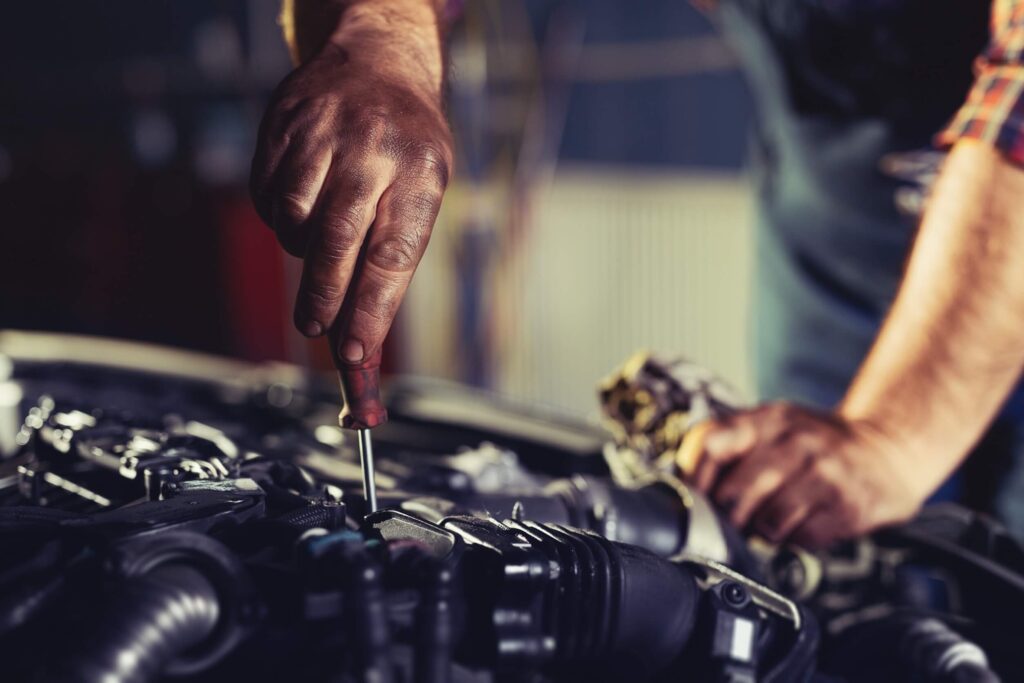
Is It Normal for the Engine to Shake a Little?
An engine is made up of several moving mechanical components, so it’s normal for the motor to move or shake a little bit. However, it should not jerk, knock, or vibrate unevenly. You will always feel the engine running, but it should still feel smooth.
If your vehicle’s engine is shaking excessively, it’s usually easy to tell. If you have any doubts, I recommend getting a second opinion.
Is It Safe to Drive When Your Car Shakes at Idle?
Like with most faults found on vehicles, it’s easier to say it’s safe to drive if you know precisely what the issue is. As you can see from the list above, some problems will be safe to go on short journeys, and some won’t.
It’s risky to drive on long journeys with any of these faults. Not only can you cause more damage to other vehicle components, but some of the faults can put you in a dangerous situation when driving.
Frequently Asked Questions
What Does Rough Idle Feel Like?
A rough idle will feel like the engine is skipping a beat; usually, a car engine will run in a harmonious rhythm.
Why Is My Engine Skipping While Idling?
When the engine skips a beat, it is a signal that it is misfiring. The most common causes are spark plug issues, coil pack failure, and a faulty engine sensor.
Final Thoughts
If your car is shaking while it’s idling, it’s an indication that there might be something wrong with it. If you cannot pinpoint the exact cause of the problem from the list of issues mentioned above, you should consider taking your car to a mechanic. A faulty motor mount or an engine misfire is usually the culprit when it comes to engine shaking at idle, and you can fix these issues with just a few tools at home.
